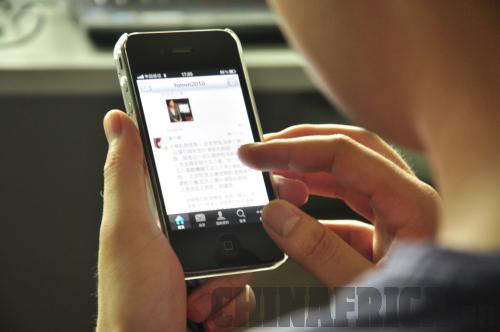| 
As people across China mourned the tragic loss of life in the high-speed train crash on July 23 near Wenzhou, Zhejiang Province, Internet forums were awash with comments, expressing sadness and anger at the accident. But as millions of messages were posted and reposted, ordinary Internet users began to struggle to discern which pieces of information were accurate and which were misleading.
A netizen self-proclaimed Guo Yao posted a piece of information on Sina Weibo, a twitter-like microblog service, on July 29, claiming her 100-day-old baby, Wang Yixuan, died in the accident but was not on the list of victims.
Some microblog users including Wu Danhong, an associate professor at the China University of Political Science and Law, examined the pictures Guo had posted, and found they weren't authentic. It has been confirmed the blogger hadn't actually lost her baby in the Wenzhou accident.
"Facing the challenge of disinformation, Internet users, the government and site operators are wondering how to manage the microblogosphere," said Dou Hanzhang, a Beijing-based researcher who helped form an anti-rumor group on Sina Weibo earlier this year.
A rising power
As of June this year, the number of microblog users in China stood at 195 million, accounting for 40 percent of all Internet users in the country.
An annual report on China's Internet users' opinions, released by the Communication University of China in March, said microblog had become the public's third most-used source of information.
Unlike traditional media channels, microblog allows anyone with an Internet connection to effectively publish whatever they want online. Users can share words, photos and videos with other users and news spreads through the network at lightening speed. And that news is not always real.
"Microblog rumors are common and hard to trace. It's been argued microblogs are self-managing, and false rumors will naturally disappear. But this is a very slow process and not an inevitable or reliable one. Hysterical rumors often do real damage," said Wu at the China University of Political Science and Law.
As China's most popular microblog site, Sina Weibo claims it has 50 million registered users, Sina Weibo established a specialized team last November, consisting of experienced investigators, to monitor the accuracy of the information posted by its users.
"With the ever increasing number of microblog users and the explosion of available information, it's difficult for Web users to distinguish postings that are true from those that are not, so the company decided to set up a group to check postings," said team leader Tan Chao.
"We don't refute a rumor until we are 100 percent sure it's wrong and have the evidence to support our judgment," Tan said. When they encounter controversial topics, the team is obliged to seek the advice of their editor in chief.
Rumormongers would be punished, Tan said, who noted that rumors appear more often during natural disasters. The team will delete false postings and even close down the accounts of users caught publishing rumors.
Besides Sina Weibo, other major microblogging service providers in China, such as Sohu.com, QQ.com and 163.com, have also established anti-rumor teams and opened official accounts on their sites to release their findings.
Vigilante rumor hunters
It's not just microblogging service providers that are taking up challenge in dispelling rumors. In May, a number of civic-minded netizens, including Dou Hanzhang, set up the Anti-Rumor League on Sina Weibo to help other microblog users identify false information.
The group is a collaborative effort that includes scholars, media professionals, lawyers, and university students, many of whom have never met each other. They communicate through instant postings.
"We work voluntarily and we do it because we love refuting rumors," said Dou, a former financial commentator at the Xinhua News Agency.
Since its establishment, the Anti-Rumor League has refuted more than 150 rumors and has already attracted more than 10,000 followers.
Compared with Sina Weibo's rumor-refuting team, Dou's group is quicker to act and judge.
Although the Anti-Rumor League has been increasingly active in the battle against Internet rumors, Dou said the government should take more responsibility and step in to deny rumors in the face of major disasters.
The government needs to adopt an open attitude and increase its transparency, they said. |